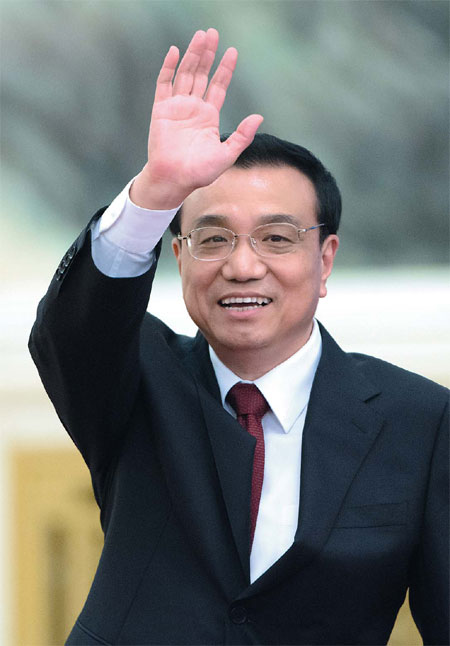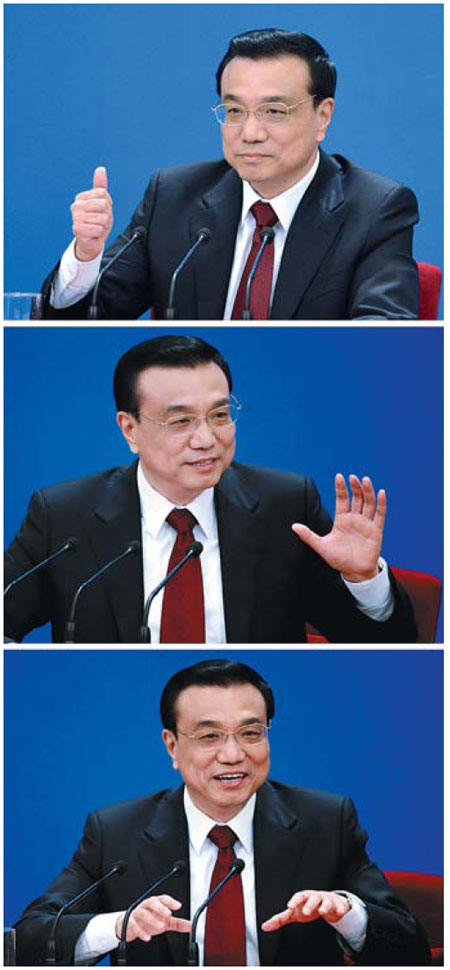The man of the people is a topic among the people
Updated: 2013-03-21 07:10
By Zhu Zhe, Cui Jia and Ding Qingfen (China Daily)
|
||||||||
|
New Premier Li Keqiang waves as he leaves his first news conference after the closing session of the National People's Congress at the Great Hall of the People in Beijing. Ed Jones / AFP |
|
Premier Li Keqiang at the news conference on Sunday. Xinhua |
New premier makes his mark with confident media appearance, report Zhu Zhe, Cui Jia and Ding Qingfen.
It's been four days since Li Keqiang gave his first media briefing as the new premier, but people are still exchanging opinions and discussing their impressions.
The briefing attracted a huge amount of attention, not only because it was seen as marking the beginning of a new and more complex phase in China's reform, but also because it signaled the completion of the process of the national leadership transition that began in November, when Xi Jinping was elected as the new head of the Communist Party.
Li, who holds degrees in law and economics and is fluent in English, was approved as premier for the next five years at this year's meeting of the National People's Congress, which closed during the weekend.
Comments from all sectors of society welcoming Li's debut media performance as premier and expressing optimism amid rising expectations of the new leadership's capabilities have piled up in the press and a variety of Internet forums.
"Li has sent out a clear message in a concise and practical way on how he will steer the new government, and he expressed his resolve to push forward reforms and strengthen the rule of law," said Li Chengyan, a professor at Peking University's school of government. "These are core issues in today's China, and we're expecting more details and action."
It has become a tradition that the premier meets the media at the close of the annual NPC session, which is usually held in mid-March. It is the only opportunity the media will get to directly question the country's top administrative leader.
'Self-imposed revolution'
At about 10:30 am on Sunday, 57-year-old Li walked into the press hall on the third floor of the Great Hall of the People - dubbed "the Golden Hall" because of its glittering decor - accompanied by four vice-premiers, all under the gaze of about 800 Chinese and foreign journalists.
During the two-hour briefing, Li employed his characteristic ease and good humor as he provided answers to a wide array of questions on topics such as reform, urbanization, corruption, pollution and food safety, without referring to notes.
Li outlined the top three tasks of the new government - to maintain economic growth, improve people's livelihoods and safeguard social justice - and pledged to push forward reforms and strengthen the rule of law.
He promised to boost reform in all sectors and build a prosperous society. "However deep the water may be, we will wade into it because we have no alternative," he said.
He said the size of the government is unlikely to expand.
The ongoing round of institutional restructuring, championed by Li, is set to streamline governmental functions and decentralize power over both the market and society. Li described this as a "self-imposed revolution" that can be as painful as "chopping off one's own arms".
He warned government employees to forget any ambitions they harbored about becoming rich - pursuing government office and making money at the same time have always been separate paths since ancient times - and used his opening remarks to call on the new leadership to uphold the country's constitution, an uncommon sentiment on such an occasion. "The law has a sacred place in our society. No matter who you are or what you do, the boundaries of the law cannot be breached," he said.
While answering a question from China Daily about reform of the controversial laojiao system - or re-education through labor - which allows the police to confine people for up to four years without trial, Li offered a short but clear answer: "It may be reformed within this year."
Li's resolve is complemented by his down-to-earth working style. He said he has tried to "strike a balance between the ideal and reality", and has pushed for reform in a gradual, but steadfast manner. "We do what we say and we brook no lip service," he told the assembled reporters.
The premier's background in law and economics equips him with the knowledge a leader needs, according to Cheng Li, head of research at the John L. Thornton China Center of the Brookings Institution in the United States. "Li is the first Chinese premier with a legal background," he noted.
"His long experience is also a huge advantage, having worked as head of Henan, the country's largest agricultural province, and also in the large industrial province of Liaoning."
Theodore Moran, a professor of international business and finance at the School of Foreign Service at Georgetown University in the US, said Li's educational background will lead observers to hope he will be a major force for greater economic liberalization and transparency, and in the fight against corruption in China.
"And his command of English helps with the impression he has on Western audiences." said Moran.
Although Li did not speak in English at Sunday's media briefing, he has often displayed good command of the language during visits overseas.
In the summer of 2011, the then vice-premier made a speech in English at the University of Hong Kong at celebrations marking its 100th anniversary.
Late last April, Li made an official visit to a number of European countries, including Russia, and was often spotted conversing in English with high-level foreign officials without the help of a translator.
"Li's ability to speak English will help make him real to the Western world," said Robert Berring, a law professor at the University of California, Berkeley, who teaches courses on the Chinese legal system. "If only the United States had leaders who spoke Chinese!"
Confident and humorous
Li Xingguo, a professor of public relations at the Chinese Academy of Governance, said he will include Li's post-NPC briefing as educational material in his classes to show young officials how to perform on such occasions.
"China's former premiers all had their own unique style when it came to media conferences; Zhu Rongji was very passionate, and Wen Jiabao loved to quote the classics," said Professor Li, adding, "Li's style is simple, professional, pleasant and smart. In general, he gives people a fresh outlook. He addresses big issues professionally, but in the form of small talk."
The professor was impressed with Li's handling of an "aggressive" question from a US reporter who asked about alleged Chinese cyberattacks in the US. The premier started his answer by jokingly suggesting that the reporter should receive a double salary because he asked the question in both English and Mandarin, a move that eased the tense atmosphere in the room.
He then used the legal term "presumption of guilt" to describe the question, which reflected his law degree background, said Li Xingguo.
The incident reminded the professor of the time a reporter from the US asked former premier Zhou Enlai why Chinese people always walk with their heads bowed. In response, Zhou laughed and replied that it was because "we are walking uphill".
"Li's debut media conference displayed his charm to the world as the premier of a large country, because he presented himself well and without affectation," said Li Chengyan from Peking University.
Li Xingguo said the premier's confident performance was the result of years of hands-on work experience at different levels. "I find that local officials have much better communication skills than those from ministries, because they meet all kinds of people. Some officials, especially those with higher degrees, tend to give big talks that are off-topic," he said.
Another notable episode at the media briefing was sparked by a question from a Hong Kong reporter, who told the premier that he had used lots of hand gestures during the discussion. The premier jokingly acknowledged that the journalist had reminded him that excessive use of gestures might distract the reporters from his answers. However, Li Xingguo said the effect was quite the opposite. "Proper hand gestures can help the audience better engage with the speaker," he said.
"During the 1976 US presidential election, Jimmy Carter was advised to integrate hand gestures in his speeches to attract the attention of the audience. He later became the 39th US president."
Hand movements also show the speaker has put his heart and mind into the content. Sometimes, such gestures can become a means of getting the message across because they help the audience identify the important points, added Li Xingguo.
Berring found Li's informal style and realistic goals appealing: "To my Western eye, this (a more relaxed style) is a good sign. If Li is comfortable in his own skin, he can accomplish more."
However, Berring also noted that the media briefing was only the first step and that the public is waiting to see if the new leaders will "walk the walk".
"Economic reform is difficult. Taking on corruption even more so," he said.
Bonnie Glaser, a senior adviser for Asia at the Freeman Chair in China Studies at the Center for Strategic and International Studies, said substance is more important than style, and implementation is more important than promises.
"The ultimate test is whether Li can carry out his pledges of economic and social reform that promise to improve the lives of the poor people who reside in the countryside, the migrants flooding into the urban areas and the retirees who are seeking affordable health care," she said.
Li acknowledges the challenges that lie ahead. "Talking the talk is not as good as walking the walk," he said.
The journey has begun.
Contact the writer at zhuzhe@chinadaily.com.cn.
Chen Weihua in Washington, Zhang Yuwei in New York, Chen Jia in San Francisco and Zhang Chunyan in London contributed to this story.
(China Daily 03/21/2013 page6)

 In Photos: 7.0-magnitude quake hits Sichuan
In Photos: 7.0-magnitude quake hits Sichuan
 Li Na on Time cover, makes influential 100 list
Li Na on Time cover, makes influential 100 list
 FBI releases photos of 2 Boston bombings suspects
FBI releases photos of 2 Boston bombings suspects
 World's wackiest hairstyles
World's wackiest hairstyles
 Sandstorms strike Northwest China
Sandstorms strike Northwest China
 Never-seen photos of Madonna on display
Never-seen photos of Madonna on display
 H7N9 outbreak linked to waterfowl migration
H7N9 outbreak linked to waterfowl migration
 Dozens feared dead in Texas plant blast
Dozens feared dead in Texas plant blast
Most Viewed
Editor's Picks

|

|

|

|

|

|
Today's Top News
Live report: 7.0-magnitude quake hits Sichuan, heavy casualties feared
Boston suspect cornered on boat
Cross-talk artist helps to spread the word
'Green' awareness levels drop in Beijing
Palace Museum spruces up
First couple on Time's list of most influential
H7N9 flu transmission studied
Trading channels 'need to broaden'
US Weekly

|

|









